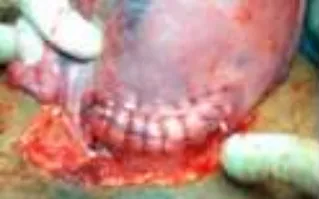Teenage Pregnancy: Successful Management of Severe Placental Abruption
Aug 27 2022 |
Medicover Hospitals |
Placental abruption is a significant obstetric complication that affects both maternal and neonatal mortality and morbidity. Moderate to severe placental abruption is a relatively rare but serious complication of pregnancy, which requires emergency management. Here we report a teenage pregnancy belonging to lower socioeconomic status, complicated with severe placental abruption (heavy vaginal bleeding with maternal shock), for which Category 1 emergency caesarean section was done at 30 weeks of gestational age. Despite being a high-risk case with severe placental abruption, obstetric catastrophe was averted and both mother and baby were saved with the help of a multidisciplinary team approach, maternal resuscita- tion, timely intervention, and effective post-operative monitoring. Clinical challenges included counselling of patient attendants, maternal and foetal resuscitation, and post-operative monitoring of the Patient. Proper medical records documentation and obtaining informed high-risk consent are of utmost importance.
Case Report
A 19-year-old female with primigravida at a 30-week 5 days period of gestation, belonging to lower socioeconomic status, presented to the emergency (ER) department with complaints of heavy bleeding per vagina for one hour. The patient had her antenatal visits booked inadequately supervised at a local hospital and she had a history of moderate anaemia in index pregnancy (Hb ~10); blood sugar and blood pressure levels were not available.
On examination, there was maternal hypotension and tachycardia (PR: 130bpm, BP: 90/60), foetal tachycardia (~180bpm), and the uterine tone was increased, and bed linen was completely soaked with blood(estimated blood loss in ER ~1 litre). On per speculum examination, there was a gush of blood with blood clots in the vagina. Per vaginal findings included soft cervix, posterior and admitting tip of the finger, presenting part vertex high up. Bedside ultrasonography revealed a live foetus with the cephalic presentation, with foetal tachycardia (190 bpm), amniotic fluid index (AFI )~10, and placenta upper segment, posterior with evidence of retroplacental clots. Blood investigations revealed Haemoglobin 6.9 g%, Platelet count 1.6 lakhs/cumm; Bleeding time, clotting time and renal function tests were within normal limits.


With simultaneous maternal resuscitation, the patient was shifted immediately for emergency lower uterine segment caesarean section (LSCS) (Category 1) with a provisional diagnosis of severe placental abruption (heavy vaginal bleeding with maternal shock). Informed high-risk consent was obtained from the family. Intraoperatively, there were ~500 cc retroplacental clots and Couvelaire uterus.
Atonic postpartum haemorrhage was managed with bimanual uterine compression and uterotonics, mother received 3 units of blood transfusions. Baby details: live birth/baby boy/1.4kg AP –6,8, no gross congenital malformations. The umbilical cord length was 35 cm. Golden minutes of an early preterm baby were taken care and the baby was stabilized by the paediatrician. Post-operative period, patient vitals, input/output, complete blood picture (CBP), and renal function test (RFT) were monitored in the intensive care unit. The histopathological examination revealed placenta had normal morphology. The patient was discharged under satisfactory condition. Both mother and baby are doing well
Conclusion
Placental abruption is a life-threatening disorder for both the mother and the foetus. If the bleeding is not arrested, then the lives of the mother and foetus are in jeopardy. If there is complete separation/ near separation of the placenta (as seen in our case), both maternal and foetal death is inevitable. Unless an immediate caesarean section is performed. Despite being a high-risk case with severe placental abruption, obstetric catastrophe was averted and both mother and baby were saved with the help of a multidisciplinary team approach, maternal resuscitation, timely intervention, and effective post-operative monitoring.
Contributors
Dr Neethi Mala Mekala
Consultant Obstetrician & Gynaecologist Fertility Specialist
News Letter
Medicover Hospitals Impact Newsletter August 2022



